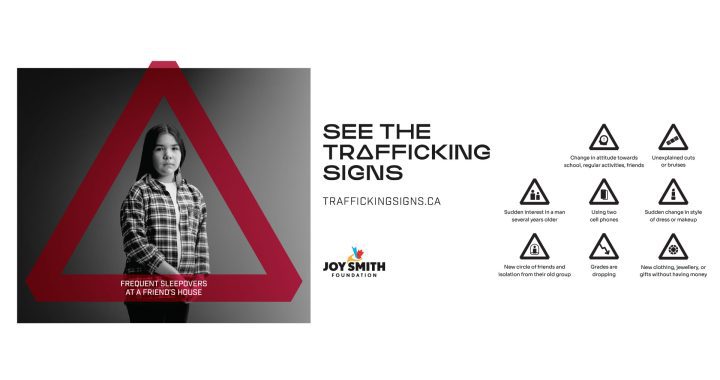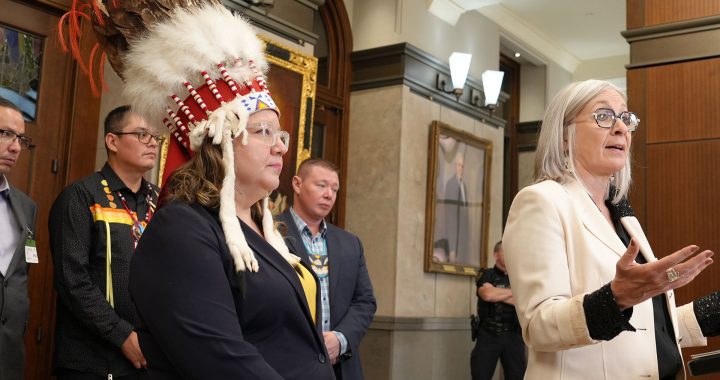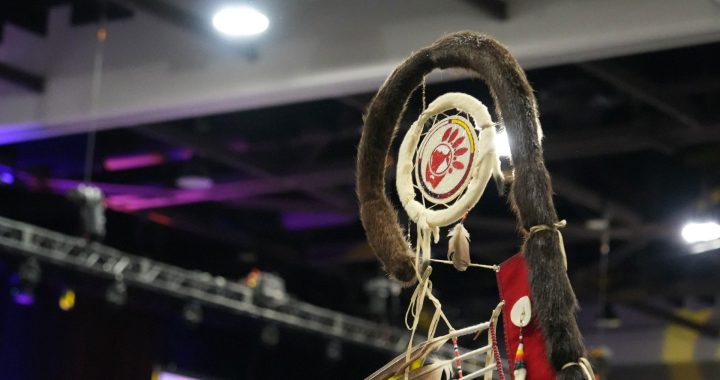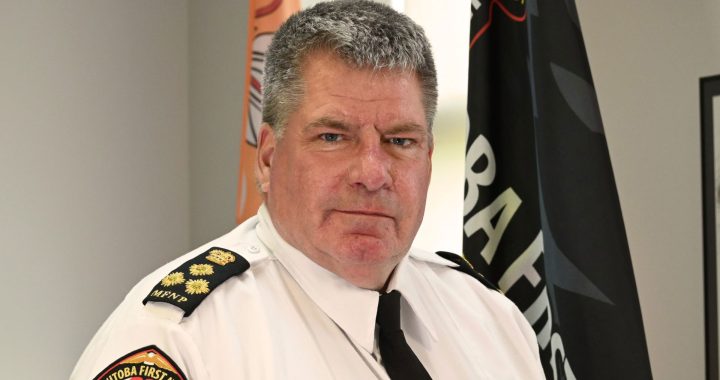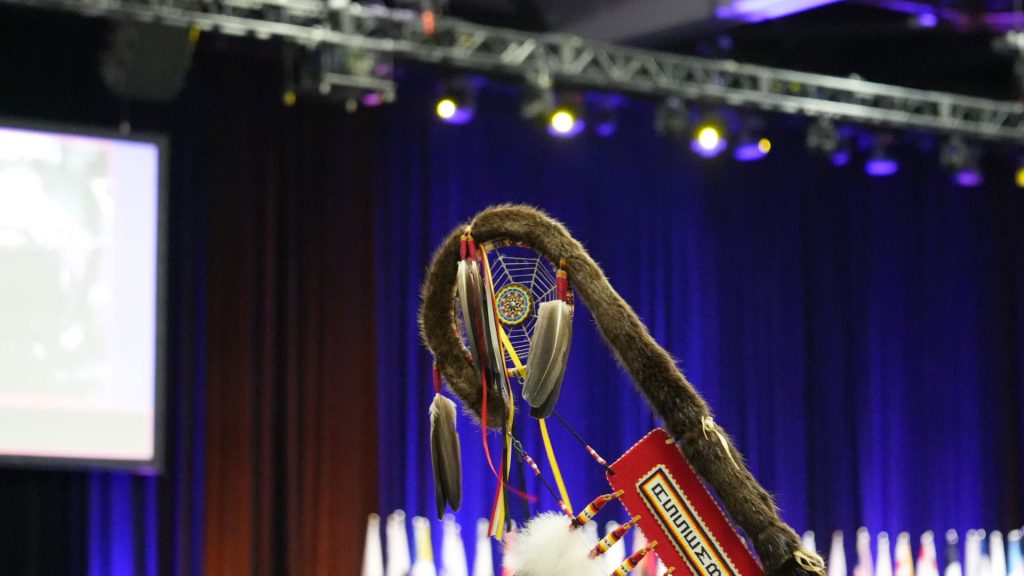
A staff on display at the AFN Special Chiefs Assembly in Ottawa in Dec. Mark Blackburn, APTN
News that the Chiefs of Ontario (COO) and Nishnawbe Askiy Nation (NAN) are moving ahead on a child welfare settlement with the federal government is not sitting well with some experts in the field.
“Nothing surprises me with Canada,” said Mary Teegee, chair of the BC Indigenous Directors Forum with Our Children Our Way. “I was a bit appalled that they would actually take that route. I think again, given the way the [final settlement] agreement was written and all the flaws, Canada was hoping all the chiefs would sign it regardless of how flawed it was because it was good deal for Canada, not for First Nations children.”
On Tuesday, the COO and NAN announced that they are going ahead with negotiations with Canada to work out a deal to reform the on reserve child welfare system in Ontario. On the same day, the Assembly of First Nations (AFN) received a letter from Ottawa that said its mandate on long-term reform of the First Nations Child and Family Services Program “does not permit further negotiations at a national level.”
Teegee, who also sits on the board of the First Nations Child and Family Caring Society, was among a group of child welfare experts and chiefs who helped defeat the draft Final Settlement Agreement (FSA) proposed to chiefs at the AFN gathering in Calgary last October. Of the 414 chiefs who voted on the proposed $47.8-billion deal, 267 opted to re-negotiate with Ottawa.
Teegee also helped draft two new resolutions, which chiefs eventually passed at their December assembly in Ottawa.
“Resolutions 60 and 61 really charted a good path that upheld the United Nations Declaration on the Rights of Indigenous people principles,” she told APTN News. “It really reflected who we are as Indigenous people, that allowed for voices of our youth, our Elders and our matriarchs to be involved in the negotiation, so Canada [is] really going just right against what the chiefs of the country are saying.
“Disregarding those resolutions, to me, is reprehensible.”
In voting down the original draft settlement agreement, chiefs pointed out problems that needed to be resolved. Their concerns included that the funding of the 10-year agreement would be subject to annual parliamentary decision and not be binding on future governments. Another concern was that the FSA would end the Canadian Human Rights tribunal’s (CHRT) role in keeping Canada accountable to First Nations children.
The FSA came about after Canada was found guilty of “recklessly” and “willfully” discriminating against First Nations children involved in the child welfare system on reserve by the CHRT.
In 2019, the tribunal ordered Canada to pay each child and caregiver $40,000 each as compensation and come up with a plan to end its discriminatory practices. The ruling also ordered Canada to end discrimination in its Jordan’s Principle program. Those negotiations are supposed to take place in the spring. Since that time, the CHRT has kept track of Canada’s work on the file and issued nearly two dozen “non-compliance” orders.
According to chiefs in Ontario, the political turmoil with the reigning Liberal Party has been worrying.
Read More:
Chiefs in Ontario negotiating child welfare deal as possible change in government looms
Why chiefs in Ontario are the only ones getting an agreement on reforming child welfare
On Jan. 6, Prime Minister Justin Trudeau announced that he would resign after a new leader was elected and in the meantime, prorogued Parliament until March 24. Opposition parties said they will hold a non-confidence vote in the House of Commons to topple the government and throw the country into an election. Polls show Conservative leader Pierre Poilievre’s party in a position to form the next government.
“I think that was something that was very clear that chiefs recognized that lived through the Harper years. I lived through the Harper years as well,” Gull Bay First Nation Chief Gilbert King told APTN.
“We’ve seen the massive cutbacks of First Nations programs and services. And, I don’t know, I’m not sure what Pierre Poilievre will do in the future, but, [based on Harper’s actions] we feel that First Nations programs and services will be cut.”
Canada needs to return to negotiations-CHRT orders still stand
Teegee said the tribunal’s decision that discrimination against First Nations children was happening nationally means the remedy has to be national in scope. To that end, the chiefs in assembly in October agreed to setting up a national children and chiefs commission (CCC) to help them move forward.
“We’ve been at work since the day after getting those resolutions passed. Getting the structure of the commission ready,” she said. “Ten of the regions have already selected a committee member to oversee these negotiations.”
According to Cold Lake First Nations Chief, Kelsey Jacko in Alberta, the representative on the CCC from Alberta, the commission was to meet Friday.
Teegee said there’s no time to waste.
“We’re saying Canada has to come back to the table. The CHRT orders are still there and the only way Canada can get away from these orders is to negotiate a just and fair settlement and then all the parties agree the terms will end discrimination and then the tribunal would vacate the field,” Teegee said. “But the CHRT would have to be provided evidence that the discrimination has ended.”
It’s not only the issue of child welfare that’s at stake, according to Teegee.
“We (Caring Society) always thought this case would be a precedent setting case for other areas that have been really underfunded and discriminatory, like health, education and water,” Teegee said. “So, that’s why I feel an obligation for us to get this right. So, later, when chiefs decide they’ve had enough with the inequities, the pathway showing how to do this would be in place.”
As for the AFN’s handling of the child welfare negotiations, Teegee is careful in her response.
“It’s unfathomable to me that you wouldn’t listen to the experts, the ones who are doing this work in the communities. There was a real divide and conquer mentality at the AFN and it’s further perpetuated by this chiefs of Ontario piece,” Teegee said.
“If there’s ever a time to be united, it’s this time, and so these fabricated divisions have to end.”
With files from Karyn Pugliese




